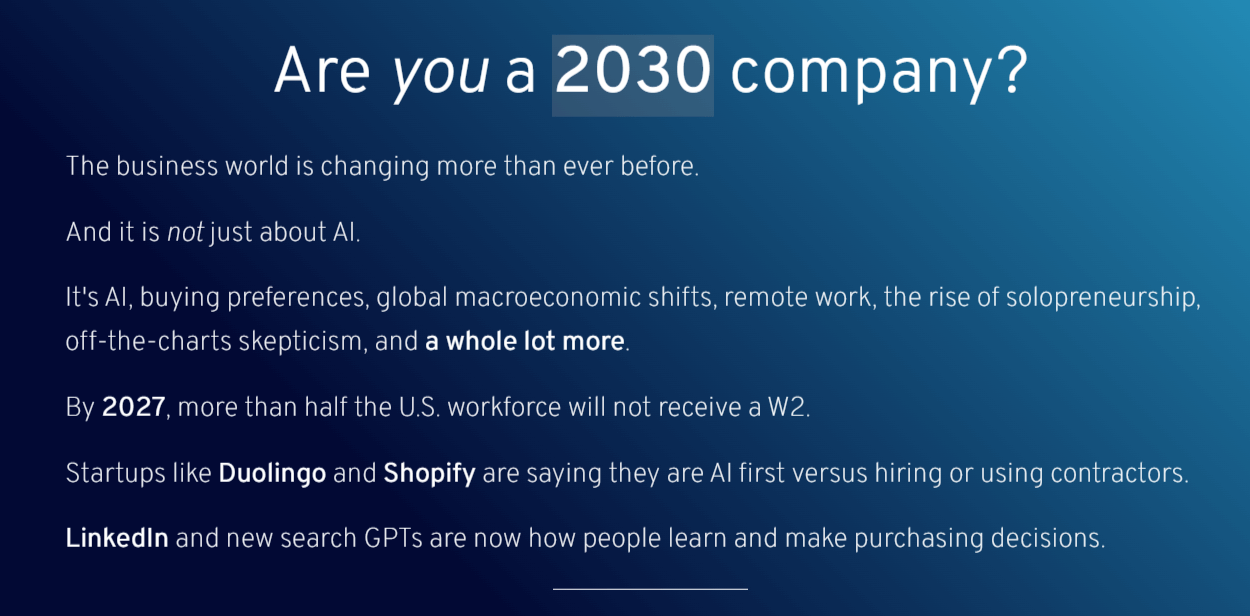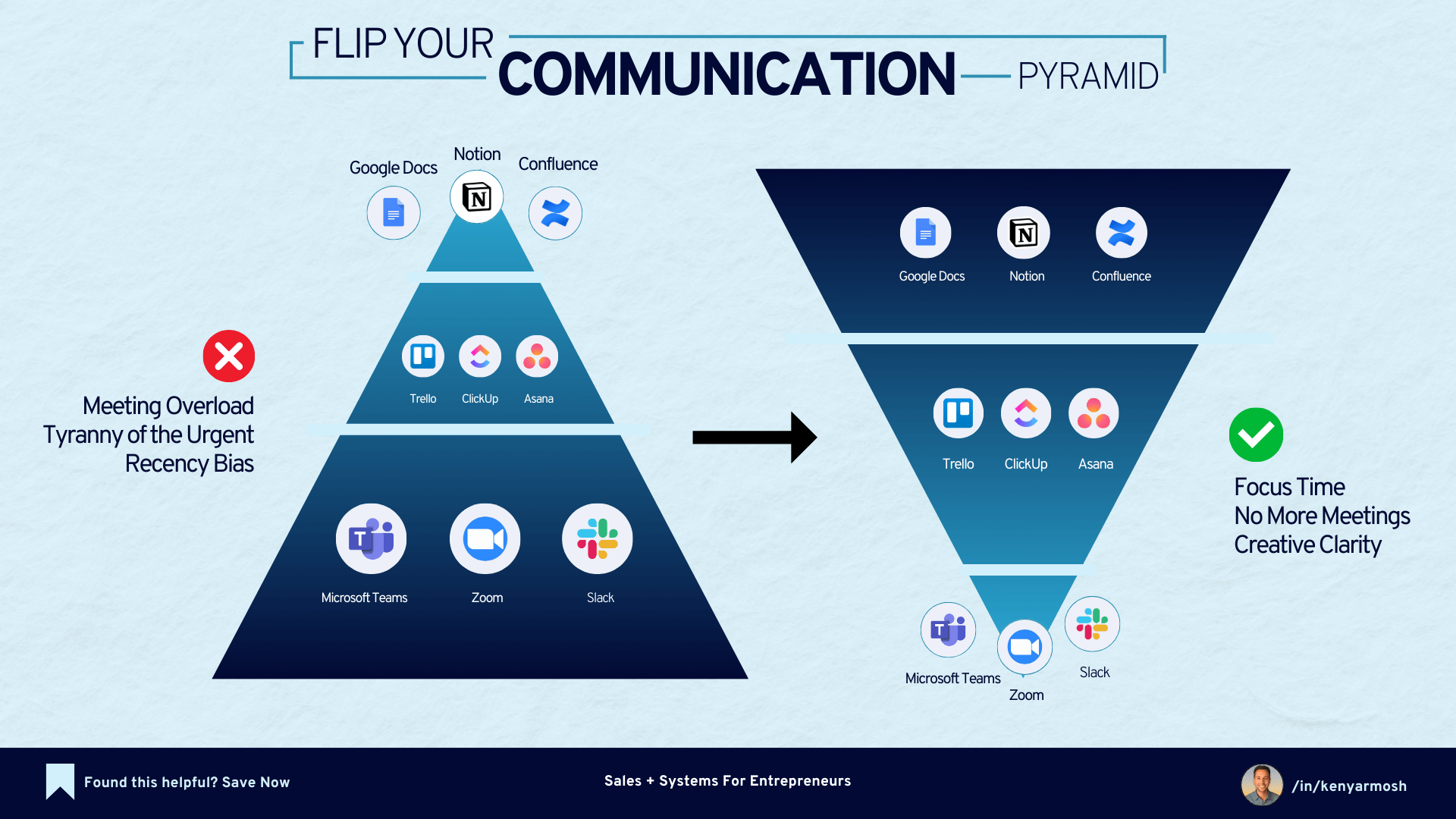🚀 TL;DR
- Business goals with a coach should go beyond revenue and growth metrics to include lifestyle alignment, energy, meaning, and sustainability.
- Ten goal areas are highlighted, such as building leverage, creating systems, scaling offers, experimenting safely, filtering clients, and learning to say “no.”
- A long-term vision, like a 2030 roadmap, helps anchor day-to-day priorities and ensures the business serves your broader life goals.
- Reverse engineering milestones, creating filters for opportunities, and protecting energy are key strategies for sustainable success.
- True progress comes from balancing financial outcomes with resilience, personal freedom, and long-term alignment between life and business.
I'll never forget the moment a client told me he'd hit his six-figure revenue goal but felt more trapped than ever.
He was working 70-hour weeks. He hadn't taken a real vacation in two years. On paper, his business was thriving. In reality, he'd built himself an expensive prison.
That conversation changed how I think about business coaching. Revenue matters, but it's not the whole story.
After working with over 551 solopreneurs, I've noticed a pattern: the ones who burn out fastest are those chasing numbers that don't align with what actually matters to them. They optimize for metrics instead of meaning. They scale income but sacrifice freedom. They’re building someone else’s dream.
When you work with a business coach, you need goals that go beyond spreadsheets. You need objectives that account for how you want to live, what energizes you, and what kind of impact you want to create.
In this guide, I'll show you exactly how to set holistic business goals with your coach—so your business supports your life instead of consuming it.
The problem with traditional business goal-setting
Traditional goal-setting frameworks treat your business like it exists in a vacuum. They focus exclusively on metrics: revenue targets, client acquisition numbers, profit margins, and growth percentages.
These numbers matter, but they tell an incomplete story.
I've worked with solopreneurs who achieved their financial targets but felt more stressed than ever. They had built businesses that required constant attention, left no room for personal interests, and drained their creative energy.
The conventional approach misses three critical elements:
- Lifestyle integration—how your business fits into your desired way of living, not the other way around.
- Alignment with your energy—whether your business activities energize or deplete you over the long term.
- Connection to your larger purpose—how your work contributes to something meaningful beyond just generating income.
When you ignore these factors, you end up with a business that works on paper but doesn't work for you.
10 holistic business goals to set with your coach
These goals go beyond revenue targets to address the full spectrum of what makes a business truly successful for solopreneurs.
Goal #1: Chart your 2030 vision and the path to get there
Define what long-term success looks like and reverse-engineer the steps to reach it. Many solopreneurs feel like they're missing a start-to-finish system. This goal creates strategic clarity so your coach helps you build momentum, not just keep busy.
I work with clients to develop a comprehensive 5 or 7-year vision that encompasses their ideal daily schedule, the type of clients they want to work with exclusively, and the income level that provides true financial security.
We map out the impact they want to create in their industry and the role they want their business to play in their overall life.

Then comes the reverse engineering. We break this vision down into yearly milestones, quarterly objectives, and monthly targets. Each goal connects directly to their larger vision.
This approach ensures that every decision you make moves you toward the business and life you want.
Goal #2: Make money work for you—not the other way around
Traditional freelancers trade time for money. Sustainable solopreneurs create value that compounds.
I help clients move from "glorified freelancer" to business owner by setting goals around:
- Recurring revenue
- Pricing power
- Business model leverage
This ensures your income grows without requiring proportional time investment.
The framework includes developing retainer relationships that provide predictable monthly income and creating premium offers that command higher rates. We build systems that allow you to serve more clients without working more hours and package your expertise into reusable frameworks and methodologies.
The goal is to reach a point where your business generates increasing value while requiring less direct time input from you.
Goal #3: Build a business that doesn't burn you out
If you're the bottleneck in every system, growth will hit a ceiling.
I focus clients on simplifying operations and installing repeatable processes. Coaching should help reduce your cognitive load, not add to it.
We document core processes so they're repeatable and improvable. We create templates for recurring tasks and deliverables. We establish clear boundaries with clients around communication and availability. We build decision-making frameworks that reduce daily choice fatigue.
The objective is to create a business that operates smoothly without constant personal intervention in every detail.
Goal #4: Work with your energy, not against it
Too many solopreneurs push through burnout or try to "muscle" their way through parts of the business they hate.
I recommend clients align their work with natural energy cycles and strengths. Your coach can help you design around what you do best.
We identify the activities that energize you versus those that drain you. Then, we structure your business to maximize the former and minimize or outsource the latter.
This might mean concentrating client calls on specific days when you're most social, blocking creative work during your peak focus hours, or hiring contractors for tasks that deplete your energy. I also recommend they adopt an asynchronous communication model to detach from too many 1:1 meetings that eat into their weeks.

The goal is to build a business that leverages your strengths rather than forcing you to work against your nature.
Goal #5: Turn offers into outcomes clients talk about
Stop selling time or task and start creating cohesive, transformative offers.
This goal shifts you from vendor to valued partner, so clients stay longer, refer more, and drive organic growth.
I work with clients to develop offers focusing on specific outcomes rather than activities. Your clients should be able to clearly articulate the value they received and the results they achieved.
This requires:
- Deeply understanding the transformation your Lighthouse Clients experience
- Structuring your services around achieving specific, measurable outcomes
- Creating systems that consistently deliver these results
- Developing case studies and success stories that demonstrate your impact
When clients can easily explain the value you provide, referrals become natural and abundant.
Goal #6: Sharpen skills that move the needle
Set goals around building capabilities like sales, storytelling, and structuring offers—especially if they're currently weak links. Coaching works best when it targets high-leverage behaviors, not just mindset.
I help clients identify the 2-3 skills that have the highest impact on their business success. These are typically strategic selling, clear positioning, systematic delivery, and effective communication:
- Strategic selling means having structured conversations that help prospects make informed decisions.
- Clear positioning involves articulating your unique value in a way that resonates with ideal clients.
- Systematic delivery creates consistent, excellent experiences for every client.
- Effective communication builds trust and manages relationships through various channels.
Focus your development efforts on these core competencies rather than trying to improve everything at once.
Goal #7: Become the go-to name in your niche
Many solopreneurs want more leads, but they need more precise positioning. Set visibility goals that make you referable—so your authority attracts ideal clients without chasing.
This isn't about becoming an influencer or building a massive following. It's about becoming known for solving specific problems for specific people.
I work with clients to define their unique perspectives on industry challenges and develop thought leadership content that demonstrates their expertise. We build relationships with other professionals who serve their target market and consistently create systems to stay visible to ideal clients.
The goal is to reach a point where people think of you first when they encounter problems you solve.
Check out how Nick more than doubled his revenue to 50k after building a category of one:
Goal #8: Test new ideas without burning down what works
Innovation doesn't require reinvention. Use coaching to set up experiments that de-risk pivots and validate offers. This lets you evolve while protecting what's already generating results.
I recommend setting aside 10-20% of your capacity for testing new approaches. Pilot programs with a small group of existing clients. Limited-time offers that test market demand for new services.
But partnership experiments expand your reach without major investment while process improvements enhance efficiency without disrupting delivery.
The key is running controlled experiments that provide learning without jeopardizing your core business.
Goal #9: Say "no" faster and with confidence
Many solopreneurs stretch themselves thin by chasing misaligned opportunities. Your coach can help install alignment filters—so your default response becomes a thoughtful "no" instead of a reactive "yes."
I help clients develop clear criteria for evaluating opportunities:
- Does this client match your ideal customer profile?
- Will this project use your core expertise and strengths?
- Can you deliver exceptional results within your existing systems?
- Is the compensation aligned with your target pricing?
- Does this work support your long-term business direction?
We practice saying no gracefully while maintaining relationships. The goal is to become selective enough that you only work on projects that truly align with your vision and capabilities.
Goal #10: Build strategic leverage—not just support
Hiring help is good. Hiring people who reduce your decision load is better.
Set goals around elevating your role from operator to strategist by building leverage that thinks, not just does.
This might include working with specialists who can make independent decisions within defined parameters, building relationships with partners who complement your expertise, creating systems that handle routine decisions automatically, and developing team members who understand your standards and can act autonomously.
The objective is to free yourself from low-level decisions so you can focus on strategy and high-value activities.
Build a business that serves your vision, not someone else's
Setting holistic goals requires a different approach than traditional business planning. Start by having honest conversations about what you want from your business. Too many solopreneurs chase goals they think they should want rather than what they desire.
Use regular check-ins to assess both quantitative metrics and qualitative experiences. Do you feel energized or drained by your work? Are you moving toward or away from your ideal lifestyle? Is your business supporting your values or compromising them?
Adjust your goals as you learn more about what works for your specific situation. Holistic business building is an iterative process, not a one-time planning exercise.
That's the difference between building a business and building a life.
If you're in the process of finding the right mentor for your solo business, let's talk:

